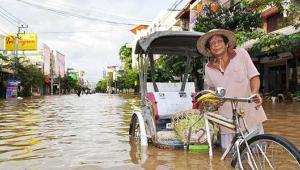Referring to a recent report from the UK’s Overseas Development Institute, Helen Clark said that early action, especially during the first 1,000 days, makes it more likely that the ambitious goals will be achieved.
Clark was speaking yesterday at the High-Level Political Forum on Sustainable Development, the first event to monitor the SDGs. She said that the poorest and most marginalised people will continue to be left behind without concerted action, and the goals will not be met.
“The earlier we act together to address their needs, the better their prospects of achieving the SDGs will be,” she said. “So I support the ‘first 1,000 days’ focus as a way of galvanising action now.”
She outlined three priorities in addressing inequality and exclusion: identifying and tackling their drivers, especially for those who are most in need; understanding the reasons why people fall back into poverty and building resilience to events like economic crises, natural disasters, disease outbreaks and conflict; and pursuing a joined-up approach that breaks down the silos between the humanitarian, development, human rights and peace-building spheres.
The UNDP commits to investing in data and evidence collection to identify the marginalised, focus its programme principles on leaving no one behind, and to expand its investment in prevention and preparedness in fragile and conflict-affected settings, she said.
In a separate event at the forum, she recognised that some countries – those affected by conflict, those with big rural populations, small island developing nations, and middle-income nations with high populations of poor people – are in “special situations” that make leaving no one behind all the more challenging.
As well as the three priorities she outlined earlier, she added that emergency development support, delivered in the midst of crises alongside humanitarian responses, is crucial.
“It can help protect hard-won development gains, and support dignity and resilience. Development planning must also be sensitive to the risk of humanitarian crises, and responsive to sudden shocks and changes in the needs of vulnerable populations,” she said.
“Across the aid sectors, we need to share our analyses and develop shared vision and approaches. This is the time to change the way we work, and to deliver together across mandates, sectors and institutional boundaries.”
In an event focused on mobilising resources to implement the SDGs and the African Union’s Agenda 2063 – a development strategy for the coming decades – she also stressed the importance of integrated approaches, partnerships and coalitions, and sharing knowledge and experience.
Blended finance mechanisms – where public grants are used to mobilise private finance, for example by de-risking a project – will be key, she said.
“Leveraging private sources of finance is critical. These can be complemented by impact investment, changes in regulatory frameworks, carbon emissions charging, eliminating inefficient and ineffective subsidies, and by enhancing financial inclusion – especially for women and young people.”
She added that increasing taxes to create effective domestic revenue streams will also be central, as will official overseas aid from foreign governments and knowledge and technology transfer, especially in areas like communicable disease control, climate change adaptation and mitigation, resilience building and economic transformation.













